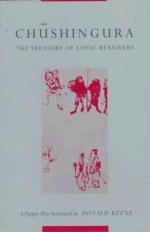|
This section contains 917 words (approx. 3 pages at 400 words per page) |

|
Point of View
Unlike most plays, Chushingura has its own narrator. This narrator speaks with a prompt, much as a character might, but instead of engaging the other actors, it instead provides description, exposition and insight. Since the play was originally performed with puppets, it's easy to see the benefit of such explicit narration. Puppets cannot express the full range of human emotion. Narration, however, can emphasize subtle cues that even a human actor might find difficult to convey.
While the narration aspires to empiricism, generally describing only what one might see or hear, the narrator also explicates character motivation, therefore serving as a values judge, therefore dispelling moral ambiguity and, in so doing, affirming societal notions of right and wrong. This necessarily serves to deny audience interpretation, as the story is pre-processed by a narrative authority. One could hardly argue on Moronao's behalf, for example, when the narrator...
|
This section contains 917 words (approx. 3 pages at 400 words per page) |

|




